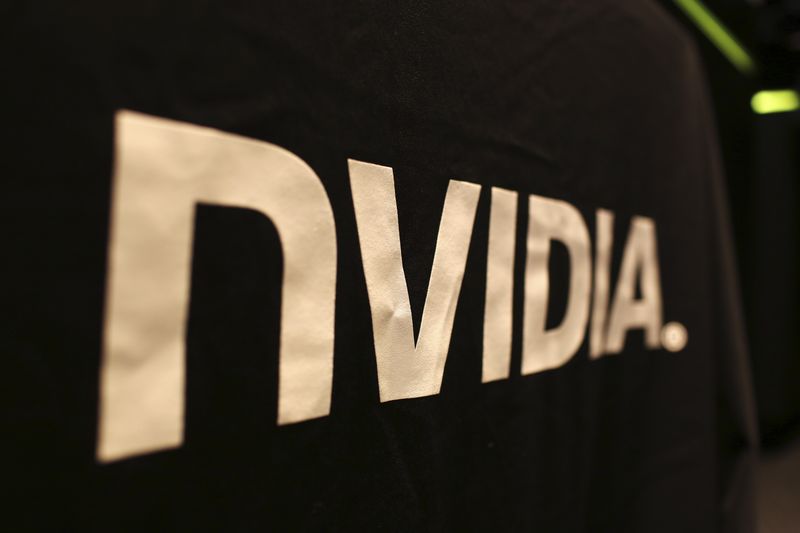Investing
This week in tech: The Nvidia-led surge

© Reuters.
By Louis Juricic and Sarina Isaacs
Investing.com — Here is your weekly Pro Recap on the biggest headlines out of a huge week for tech: Nvidia and Marvell’s stunning guidance; China’s ban on Micron chips; and the Apple-Broadcom deal.
InvestingPro subscribers got these headlines in real time, giving them a chance to rapidly readjust their portfolios to a relentless news cycle. Start a 7-day free trial now.
Nvidia nears $1T market cap after bolstered outlook
Nvidia (NASDAQ:) soared 27% Thursday, taking its market cap within spitting distance of $1 trillion, after the chipmaker reported better-than-expected first-quarter results and guidance that markedly topped Wall Street estimates.
The company said it expected second-quarter revenue of about $11B, well above analyst expectations of $7B, as the growing need for artificial intelligence has bolstered the outlook for chip demand in its data center business.
The numbers prompted three Wall Street firms to upgrade the stock and raise its price target by hundreds of dollars per share: Nvidia now has buy ratings at Craig-Hallum, Wedbush, and Baird – up from prior neutral ratings – with price targets ranging between $475 and $500.
The action in Nvidia triggered a surge across the tech space and ultimately led a broad-market rally.
Monolithic Power Systems (NASDAQ:), which provides power management solutions for some of Nvidia’s chips, was up sharply, as were Taiwan Semiconductor Manufacturing (NYSE:) and Advanced Micro Devices (NASDAQ:).
Over in Europe, ASM International NV (AS:), ASML Holding NV (AS:), and Siltronic AG (F:), also saw big gains.
Nvidia ended the week at $389.46.
Micron chips get banned in China
A day earlier, Micron Technology (NASDAQ:) said its revenue growth would come in the low-single-digit percentage, down from the high single digits, after China banned the sale of its memory chips to a wide swath of key industries in the country, saying they had failed a national security review.
Micron said last week it would start making next-gen memory chips in Japan. Bloomberg News reported the chipmaker will receive about $1.5 billion in financial incentives from Japan’s government.
Bernstein estimates that the impact will be measured in “low-single digits only in the near term,” noting that the ban is only on “domestic critical information infrastructure operators” and that “other customers, especially those selling civilian products to other countries, are not legally required to do so.”
Citi says the decision was expected and “will temporarily hurt Micron but won’t interfere with the DRAM recovery.”
Micron shares lost ground initially but more than recovered, ending the week up about 12% to $73.93.

Apple strikes a ‘multi-billion-dollar’ deal with Broadcom
On Tuesday Apple (NASDAQ:) and Broadcom (NASDAQ:) announced a “multi-billion-dollar” deal that will see the tech behemoth purchase 5G radio frequency components from Broadcom, including its FBAR filters.
“We’re thrilled to make commitments that harness the ingenuity, creativity, and innovative spirit of American manufacturing,” said Tim Cook, Apple’s CEO.
Wall Street weighed in positively.
CFRA boosted the AVGO price target to $750 per share after hiking price-to-earnings estimates to reflect the Apple deal. It noted opportunity arising from the company’s AI initiatives and said it thinks shares have upside “whether a deal is done or not.”
Similarly, BofA raised its price target on Buy-rated AVGO shares to $800 per share. The analyst argues that the Apple contract removes “key overhang re trends at largest customer” and said the stock has a “highly underappreciated/overlooked position as a leading provider of custom AI computing and switching silicon.”
BofA added that Broadcom is the “most underappreciated AI beneficiary.”
Marvell surges on robust AI-driven guidance
Marvell Technology (NASDAQ:) shares rocketed more than 30% Friday after the chipmaker reported better-than-expected and offered encouraging revenue guidance for the current quarter as AI emerges as a key growth driver.
The chipmaker reported Q1 adjusted EPS of 31 cents on revenue of $1.32 billion, compared with estimates for 29 cents on revenue of $1.30B.
Looking ahead, the company forecast fiscal second-quarter adjusted EPS to be 32 cents per share, plus or minus 5 cents, while net revenue is expected to be $1.33B, plus or minus 5%. That compared with Wall Street estimates for EPS of $1.31 and revenue of $1.31B.
The company sees annual revenue related to artificial intelligence to at least double in fiscal 2024.
Stifel raised its price target by $9 to $65, saying the company’s big data infrastructure bet is paying off: “Given the increased visibility into healthier q/q growth rates and material operating leverage, we reiterate Buy on MRVL (top large-cap pick).”
Rosenblatt still sees Marvell and Nvidia as top secular ideas, and has a $100 price target on MRVL stock: “Now that the overhead of inventory concerns has been lifted and AI momentum is emerging the story is cleaner from here on out.”
Senad Karaahmetovic, Yasin Ebrahim, Scott Kanowsky, and Davit Kirakosyan contributed to this report.
In fast-moving markets, every second counts – and InvestingPro subscribers are always one step ahead with lightning-quick updates. Start your free 7-day trial now.

Read the full article here

-

 Make Money7 days ago
Make Money7 days ago10 Critical Questions to Ask Your Financial Advisor Now
-

 Make Money6 days ago
Make Money6 days ago10 Ways to Make Money As a Graphic Designer
-

 Personal Finance5 days ago
Personal Finance5 days agoIf you are 60 years old, new 401(k) rules could save you money
-

 Investing6 days ago
Investing6 days agoCould Easier Cancellations Build Customer Loyalty?
-

 Investing7 days ago
Investing7 days agoAirbus keeps top spot with 766 jet deliveries in 2024 By Reuters
-

 Investing4 days ago
Investing4 days agoBank regulator gives BlackRock new deadline on bank stakes, Bloomberg reports By Reuters
-

 Side Hustles6 days ago
Side Hustles6 days agoTrump’s 2025 Inaugural Committee Raises Record $170 Million
-

 Passive Income7 days ago
Passive Income7 days agoHow to Build a Solid Go-to-Market Strategy for 2025


















